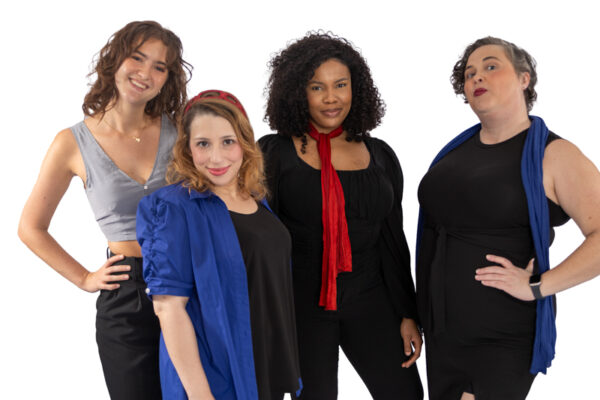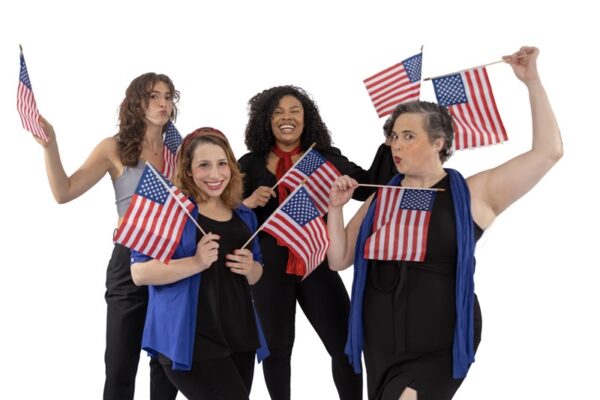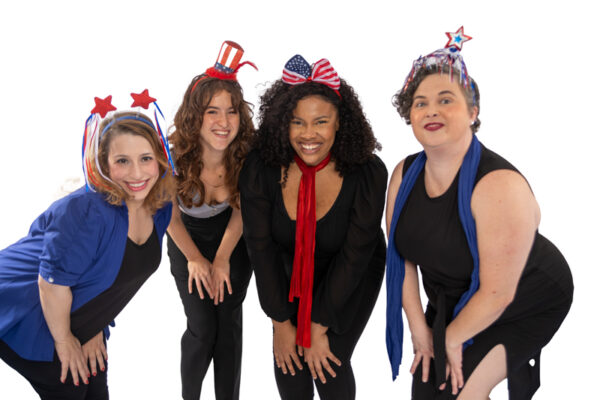AS USUAL, THE WOMEN DEAL WITH THE MESS
Hub Theatre Company‘s pay-what-you-will production of 46 Plays for America’s First Ladies offers a series of playlets as varied as the women portrayed. There are many surprises in store here. First of all, while the United States has had forty-six presidents, there have been many more First Ladies than that — a number of presidents, including Andrew Jackson, William Henry Harrison, John Tyler, and Woodrow Wilson had more than one First Lady during their tenure, which paves the way for the next surprise, which is that not all First Ladies have been married to a president. A number of First Ladies have been sisters, daughters, nieces, or even daughters-in-law. What is made clear is that while First Ladies are not elected and endlessly criticized, it is nearly impossible for a presidential administration to function without one (Martin Van Buren tried, and after six months in office, brought his twenty-year-old daughter-in-law Sarah Angelica Van Buren into the White House to serve as hostess).
The script by Chloe Johnson, Sharon Greene, Genevra Gallo-Bayiates, Bilal Dardai, and Andy Bayiates of the Chicago-based Neo-Futurists packs a lot in, and it does so in an entertaining way. Director/Choreographer Ilyse Robbins makes it all happen on a small stage in the cabaret-style setting of Club Café, with a set (Justin Lahue) that consists of little more than some patriotic bunting and a series of wooden boxes that function as storage for props, but it carries us through nearly 250 years of history with lights by Emily Bearce, sound by Gage Baker, and costumes by E. Rosser (often consisting of little more than a strategically tied scarf).
Performers Yasmeen Duncan, Lauren Elias, Eleni Kontzamany, Sophia Muharram, and Katie Pickett rotate among the various First Ladies along with a number of selected presidents, members of the press, and other characters. Each First Lady (surprise!) is unique, and the playlets reflect their personalities and backgrounds. Appropriate to director Robbins’s choreography, some of the most memorable segments involve musical numbers: We’ve got the rock star Abigail Adams urging us to “remember the ladies”; blues singer Julia Grant, daughter of a southern slave-holding family married to a Union Civil War hero, singing the Blue and Gray blues; young Frances Cleveland, married at twenty-one to forty-nine-year-old President Grover Cleveland, dancing to “Girls Just Want to Have Fun;” Edith Wilson waltzing a stiffly inexpressive President Wilson around the stage; Betty Ford performing an exercise routine as she discusses her struggles with drug and alcohol dependence; and Barbara Bush leading a line dance as she sings about her role as the nation’s grandma.
There are tragedies aplenty in these stories — Anna Harrison lost many of her children to early death and never set foot in the White House because her husband William Henry Harrison died of pneumonia after just one month in office, before Anna could make the trip from Indiana to Washington, D.C., and Jane Pierce, whose only surviving child died in a gruesome train accident on their way to Washington, D.C. for Franklin Pierce’s inauguration, never overcame her depression (yet she tells us the story of her grief in the role of a stand-up comic).
There are accomplishments, as well. Louisa Adams, married to John Quincy, traveled with him on diplomatic missions before he was elected president and is credited with brokering trade deals between Russia and the young United States. Lou Hoover, First Lady to President Herbert Hoover, was a geologist and activist on behalf of humanitarian causes, rights for women, and racial integration, preceding the accomplishment of her more celebrated successor, Eleanor Roosevelt.
With so many great roles and intriguing situations, I lost track of which performer was in which role, which might be seen as a nod to the ability of the performers to so fully inhabit these diverse women that I stopped seeing them as actors. Two performances that stood out, however, were Katie Pickett’s depiction of an enraged Rosalynn Carter, furious at the voters’ failure to recognize her husband’s hard work and decent character and vote him in for a second term, and Yasmeen Duncan’s portrayal of Michelle Obama walking a balance beam in heels’”attempting to be herself “while playing a role,” as she had been advised. Another especially memorable portrayal was that of Hillary Clinton, presented as a witch-like giant puppet (E. Rosser and Samantha Mastrati) that embodies all the lies and accusations directed against the former First Lady, Secretary of State, and presidential candidate.
Throughout the show, the stage is repeatedly littered with scraps of paper and other bits of rubbish, requiring the actors to take turns with cleaning things up. As the decades and centuries pass, the various First Ladies become aware that they are holding a political appointment that offers numerous opportunities for influence–and numerous risks of incurring public criticism. I do wish the projected titles and informed us of the names and dates of each First Lady, along with an identifying tag line, had remained visible for a longer time to give us a chance to fully digest who we were seeing. While a few of the playlets, especially those involving less well-known First Ladies or involving multiple First Ladies, were confusing, all in all, it is pretty amazing how much information was convey so clearly and in such an entertaining manner during the two-hour running time of this production.
The play ends with a rousing reminder that we all pay a role in our nation’s political future. Jill Biden and Kamala Harris stand on the stage together, reflecting on the difference between a First Lady and the first woman to do something, e.g., hold the position of vice president. This reflection became especially powerful when I turned on my phone after the show to learn that President Joe Biden had announced he was dropping out of the presidential race and had endorsed Harris as the Democratic nominee for president. Harris’s hoped-for victory raises a question, of course — how will the role of First Spouse change once it is occupied by a man?
photos by Andrew Keef
46 Plays for America’s First Ladies
Hub Theatre Company
Club Café, 209 Columbus Ave. in Boston’s Back Bay
ends on August 3, 2024
Thurs-Sat at 7; Sun at 2
for tickets (Pay-What-You-Can), visit Hub Theatre
all audience members will receive 20% off their total food bill at Club Cafe





